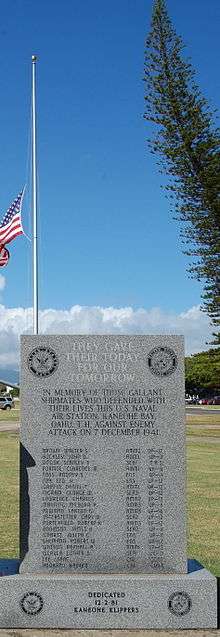Daniel T. Griffin
Daniel Thornburg Griffin (March 25, 1911 – December 7, 1941) was an American naval pilot who died defending the Naval Air Station, Kaneohe Bay during the December 7, 1941 Japanese attack on Pearl Harbor.
Early life
Daniel T. Griffin was born on March 25, 1911 in Allendale, Illinois to the Reverend Pearl D. Griffin and his wife Pernia. Pearl was a traveling minister and moved the family from town to town until they settled in Colorado Springs, Colorado. Growing up, Daniel enjoyed the hunting and fishing that the Colorado Springs area provided. During his last several years of school, he was employed with the Gazette & Telegraph Co. in Colorado Springs.
Naval career
At 19 years old, Griffin decided to enlist in the United States Navy. His enlistment began on October 6, 1930 where he was assigned to complete his basic training at the Naval Training Station in San Diego, California. Following basic training, he went on to served aboard the USS California, USS Tennessee, and USS Saratoga. During his career, Griffin decided he wanted to become a pilot. He began ground training at Naval Air Station Pensacola in 1936, and in reported to flight school in 1937. Daniel graduated in February 1938 as an AMM2C "NAP" Naval Aviation Pilot. Shortly after receiving his PBY pilot's license, he was transferred to Pearl Harbor and served with PBY Patrol Squadron 8, then later with PBY Patrol Squadron 24 at Ford Island. When his plane, along with other planes and crews from PBY Patrol Squadron 24, were transferred to Kaneohe Bay in March 1941, PBY Patrol Squadron 24 was re-designated as VP-12.
He re-enlisted in October 1941.

December 7, 1941
On the morning of December 7, 1941, Griffin was standing routine watch at Kaneohe Naval Air Station. His PBY was at the ready; sitting in the bay with two of the four crew members already on board. When Griffin saw the Japanese planes approaching the base, he realized that they were not from the United States military. He called out to the crew members on board the plane to start the engines as he began to swim out to the PBY. Griffin settled into the pilot's seat and began to taxi the plane for takeoff. His PBY was hit by Japanese gunfire just as he became airborne. It caught fire and sank in Kaneohe Bay where, according to the University of Hawaii and East Carolina University, it still rests today. Griffin was badly burned but managed to escape the plane and attempt to swim back to shore. The Japanese planes continued strafing the Kaneohe Bay waters with machine gunfire. He sustained a bullet wound to the head which entered on the right side behind his ear and exited on the left side of his face, killing him instantly. It is believed that he was the first serviceman to die at Kaneohe Bay that day.
Griffin's wife, Lucille, having seen his plane taxiing down the bay and later on fire, didn't know if her husband had survived. On December 12, the Kaneohe police called the base to report that a body had washed ashore. Griffin was identified and pronounced dead. He was buried in a temporary grave on the north shore of Kaneohe Island with several other servicemen who perished during the attack. His body was later exhumed and reinterred at a cemetery in Colorado Springs.
His commission to ensign arrived at the base two weeks after his death.
Griffin's wife later received a Letter of Citation from Admiral Chester Nimitz citing the bravery of his actions with utter disregard for his personal welfare.
Personal life
Griffin was married to Lucille, and together they were raising their two children (Danelle and Donald) in the military housing at Kaneohe Bay Naval Air Station. During the attacks on December 7, Lucille placed her infant son Donald in a storage area just inside the house, where she hoped he would be safe. She ran to retrieve her daughter Danelle who was playing outside. Lucille watched in terror as Daniel's plane taxied down the bay and turned to head into the wind. Moments later, she saw smoke and fire everywhere. A bomb had hit near the Griffin house and when she retrieved little Donald from storage, he had a small amount of blood coming from his ears as a result of the concussion caused by the bomb hitting so close to his shelter. He also sustained damage to his optic nerve, which required three eye surgeries in his childhood. Following Daniel's burial, Lucille and the children moved back to the mainland.
USS Daniel T Griffin
On February 5, 1943, Lucille had the honor of christening the destroyer escort USS Daniel T. Griffin (DE-54). The Daniel T. Griffin survived three kamikaze attacks during the war and many battles. It stayed in the United States naval fleet until 1966 when it was purchased by the Chilean government. It was decommissioned in 1994, and used one last time as a training target and sunk. It now rests in the waters off Talcahuano, Chile.
References
- This article incorporates text from the public domain Dictionary of American Naval Fighting Ships.
External links
- Official Report on Attack at Kaneohe
- USS Daniel T Griffin
- USS Daniel T Griffin - Destroyer Escort Sailors Association
- Pearl Griffin Obituary
- Burials at Kaneohe Bay
- Memorial to the fallen
- NAS Kaneohe 1941
- Military photos from attack on Kaneohe Bay 1941
- ECU Article on wreckage
- University of Hawaii 2015 Report on the plane